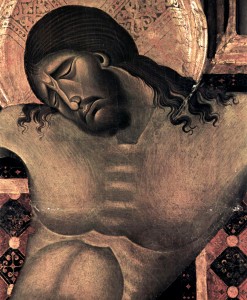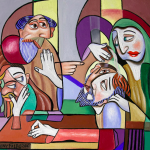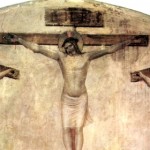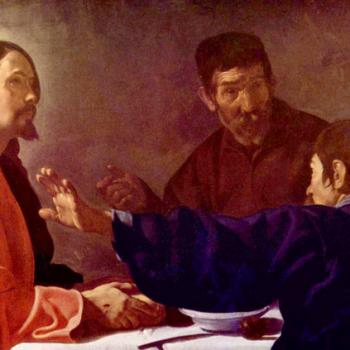In this year’s Lectionary cycle, Luke’s Gospel is walking many of us through the life and death of Jesus. Luke has his own invitation to issue in looking at the death of Jesus.
But he also makes a brilliant move in bringing a scene from elsewhere in the story squarely into the frame of Jesus’s passion.
It’s a story that shows us that the death of Jesus is not just about him. It’s about us.
Christ and Follower
In Mark’s Gospel we see three passion predictions. Each time, the disciples reject such a destiny for Jesus. And each time Jesus tells them that this cruciform destiny isn’t just about him. It’s about them as well. 
“If anyone wants to be my disciple, that person must deny herself, take up her cross, and follow me.”
Luke brings one of these exchanges into the upper room. Jesus has passed around the cup. He has distributed the bread. He has predicted that the Son of Man is about to be betrayed.
Then they do it.
The disciples start arguing about which one of them seems to be the greatest.
Seriously. Right after Jesus invites them into the story of his death. Right after he says that betrayal is right around the corner. Right after (in other words) Jesus making it clear that “seeming to be great” is not the stuff of the Kingdom of God.
What is true for the King must be true for the subjects as well. The disciples are looking for the glory while rejecting the way of the cross.
So Jesus calls them back.
It’s the kings of the Gentiles who lord it over their people. (I’m not that kind of king.)
Those who have authority over them want to be called benefactors. (I’m not bringing or giving to you that kind of authority.)
Jesus invites them to flip all of this on its head:
Become like the person at the bottom of the pecking order. Pursue greatness by becoming like the youngest.
Do you want to be thought to be something? Become like the person who serves.
You can’t separate the king and the kingdom. You can’t separate Christ and his followers. This is probably the most important thing that the cross shows us and does for us: it demonstrates that the economy of the kingdom of God turns the world’s economy of power and glory and wealth and honor on its head.
Serving Tables
Jesus has served the disciples the Passover meal. He has served them his very life as he has given them his body and blood. It seems that they might have missed it. So Jesus goes on to connect the dots.
Who’s greater? The one who stands to serve or the one who sits to be served? Look–I’m here as the one serving the table.
Greatness, faithfulness, honor, privilege, being thought to be greatest—a subversive new vision is being enacted before their eyes.
It’s a hard lesson to learn. Every day we swim in waters of judgment and self-assessment that push us toward being thought to be something.
We are enculturated to judge by what we see, to participate in the economy of greatness that makes our own kings and rulers rise to the top.
It’s a hard lesson to learn. Just ask the disciples.
After Jesus’s death and resurrection, while the church was starting to bustle in Jerusalem, there was a dispute. The Greek-speaking Jewish widows were being neglected in the daily distribution of food. The problem was brought to the disciples.
“Well… It would be a huge mistake for us to leave aside the really. important. stuff we do. I mean, seriously–leave aside the preaching of the word and prayer for… what? serving tables? I don’t think so.”
And then the story of Acts, for the most part, quietly leaves the disciples behind as the table-servers fulfill Jesus’s mandate to take the gospel to all Judea and Samaria.
It’s a hard lesson to learn.
The easiest thing in the world is for us to create a Christian sub-culture that is just our own version of what’s on offer “out there.” The easiest thing in the world is for us to laud and honor those who can run a successful multi-million dollar business. The easiest thing in the world is for us to laud and honor those who can earn Ph.D.s at research universities. The easiest thing in the world is for us to scrap and fight for our agendas and ourselves even in the church.
But the Passion Narrative points to a different way.
It shows us that entrusting ourselves to this story is dangerous business. It shows us that the danger did not pass on Easter Sunday. It shows us that we risk everything to follow Jesus.
We, too, must be like the servant. We, too, must be like the child. We, too, must betray the power brokering of the world we find ourselves in every day and expect to be betrayed in kind.
Yes, there’s plenty of glory to be had. Yes, there’s plenty of greatness to be considered. “But not so among you.”












